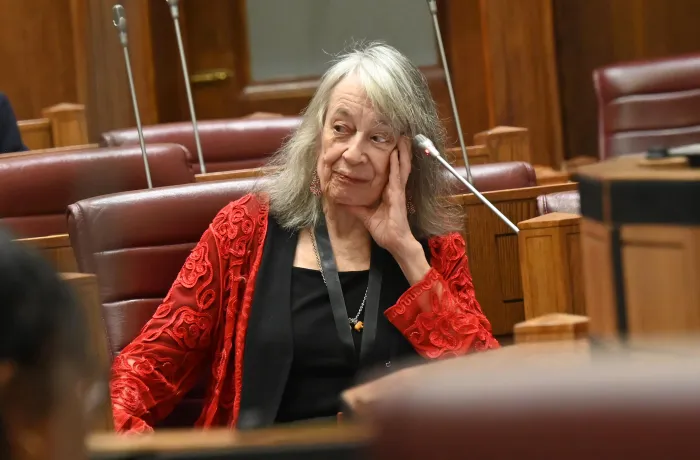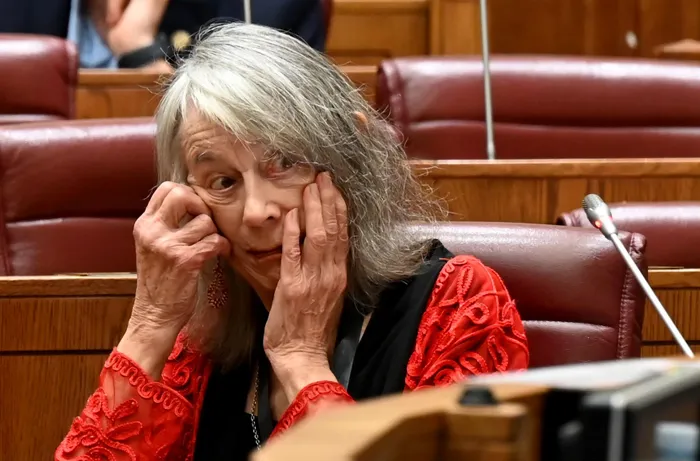
The Ad Hoc Committee to Investigate Allegations made by SAPS KwaZulu-Natal Provincial Head Lieutenant General Nhlanhla Mkhwanazi hears evidence from Dr Mary de Haas.
Image: Ayanda Ndamane/Independent Newspapers
UNIVERSITY of KwaZulu-Natal’s (UKZN) association with Mary De Haas is only limited to the position of Honorary Research Fellow in the school of law, and not a professor.
De Hass, identified as a researcher and crime activist, appeared before Parliament on Tuesday where MPs lamented her disappointing testimony which they said largely relied on hearsay.
During her appearance before Parliament, De Haas provided the committee with the information she received from confidential sources but refused to divulge their names and identities.

The University of KwaZulu-Natal (UKZN) has distanced itself from crime activist, Mary De Haas, following her appearance before the Ad Hoc Committee on Tuesday.
Image: Ayanda Ndamane/Independent Newspapers
She also declined to reveal the names even in a private session.
This resulted in her testimony being described as “disappointing, unreliable and hearsay” by several members of the committee, arguing that her refusal to disclose the names made her evidence impossible to verify.
The Ad Hoc Committee is currently investigating serious allegations of police corruption, criminal infiltration, and political interference within the South African Police Service (SAPS) and the broader criminal justice system.
The committee was established following explosive claims made by the KwaZulu-Natal Police Commissioner, Lieutenant General Nhlanhla Mkhwanazi in July.
De Haas is also widely referred to as “Professor” by the media and in public discourse.
Her qualifications were also questioned by an EFF MP, Leigh-Ann Mathys, who said that De Haas does not hold an earned doctorate and that her “Dr” title comes from an honorary degree.
However, De Haas stated that she is “sick of saying” she is not a professor and aims to disassociate UKZN from personal insults.
In response to concerns raised regarding the university’s association with De Haas, UKZN Executive Director of Corporate Relations Normah Zondo, said De Haas was not an employee of the university.
“She retired from the then university of Natal in 2002, where she served as a Senior Lecturer and Programme Director in Social Anthropology,” she said, adding the University of Natal merged with the University of Durban-Westville in 2004, to form UKZN.
Zondo added that De Haas's current association with UKZN is limited to the position of Honorary Research Fellow in the school of law. She said the position does not involve employment or teaching responsibilities.
“While she has collaborated with members of the Navi Pillay Research Group, she also conducts independent research, which is entirely separate from the university, and this includes work on violent crime and policing,” said Zondo.
Political analyst Professor Sipho Seepe said De Haas’s performance risked undermining her relationship with UKZN, adding that the institution may choose to disassociate itself from her.
Seepe added that her reluctance to reveal her sources is understandable as the government has been unable to protect whistleblowers from acts of violence and intimidation, even though her submission will be rendered to be nothing more than hearsay.
“In the absence of verifiable testimonies and authenticated documents, Mary de Haas' submission would be rendered to be nothing more than hearsay. Her performance risks undermining her relationship with UKZN. The institution cannot be held accountable by acts of individuals associated with it. UKZN may choose to disassociate itself with her,” said Seepe.
Cape Times